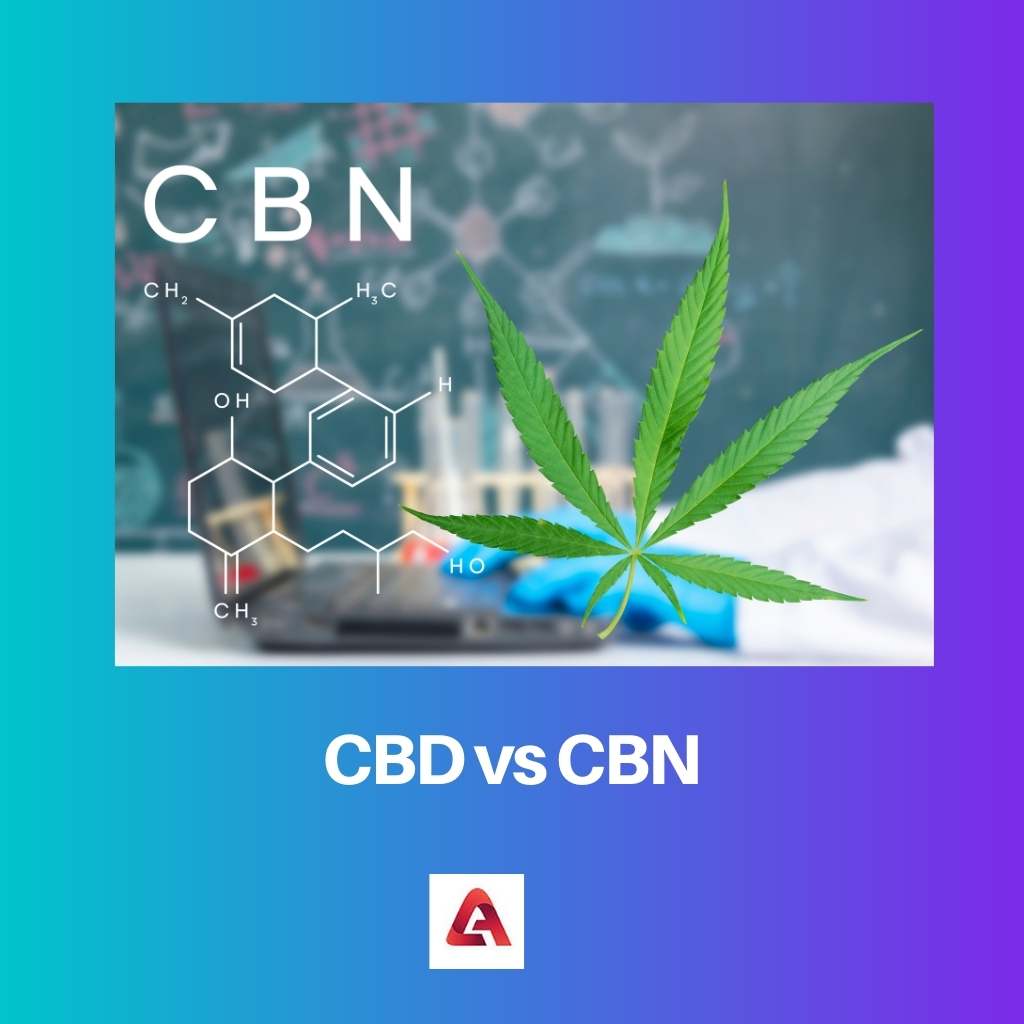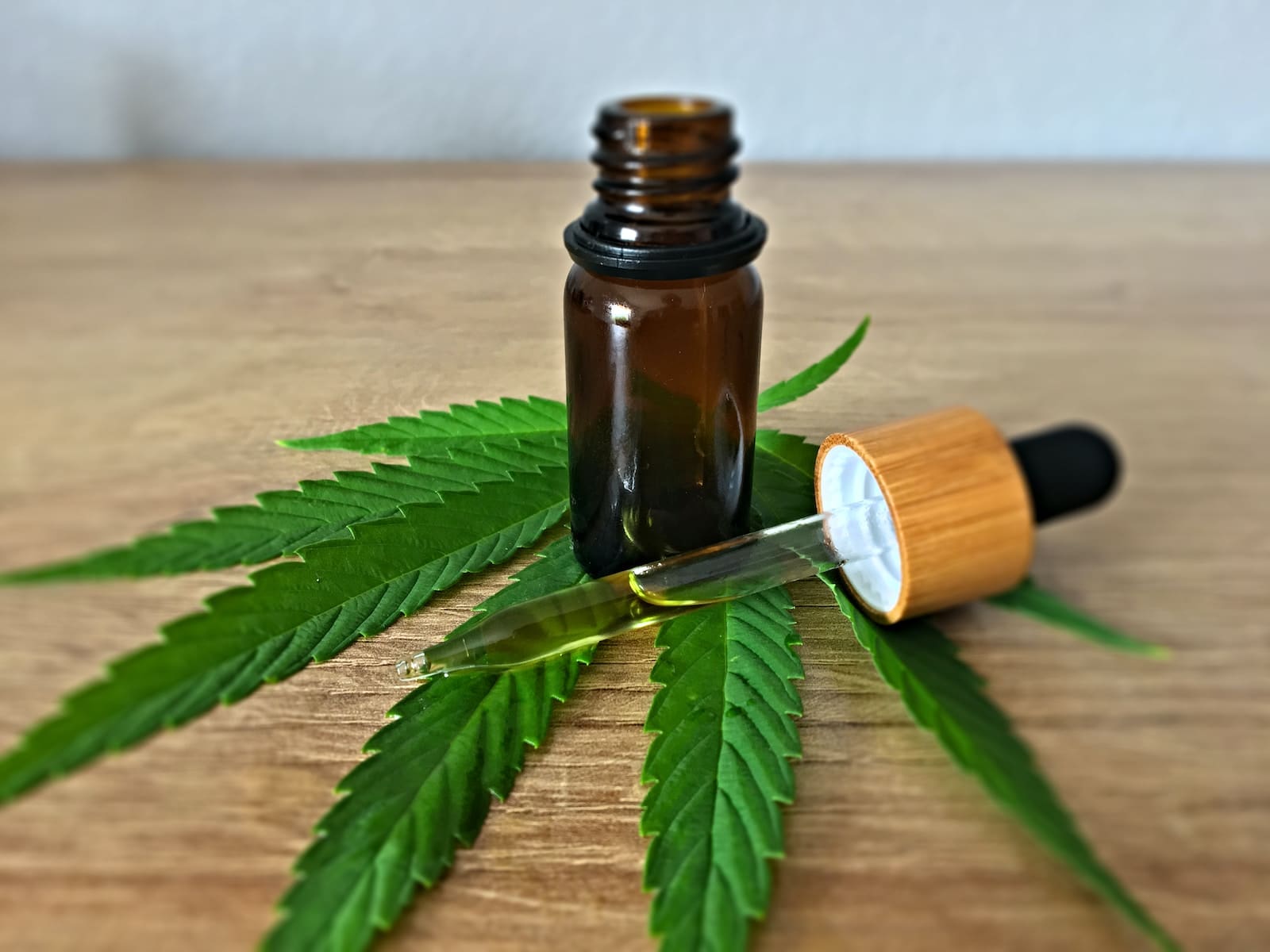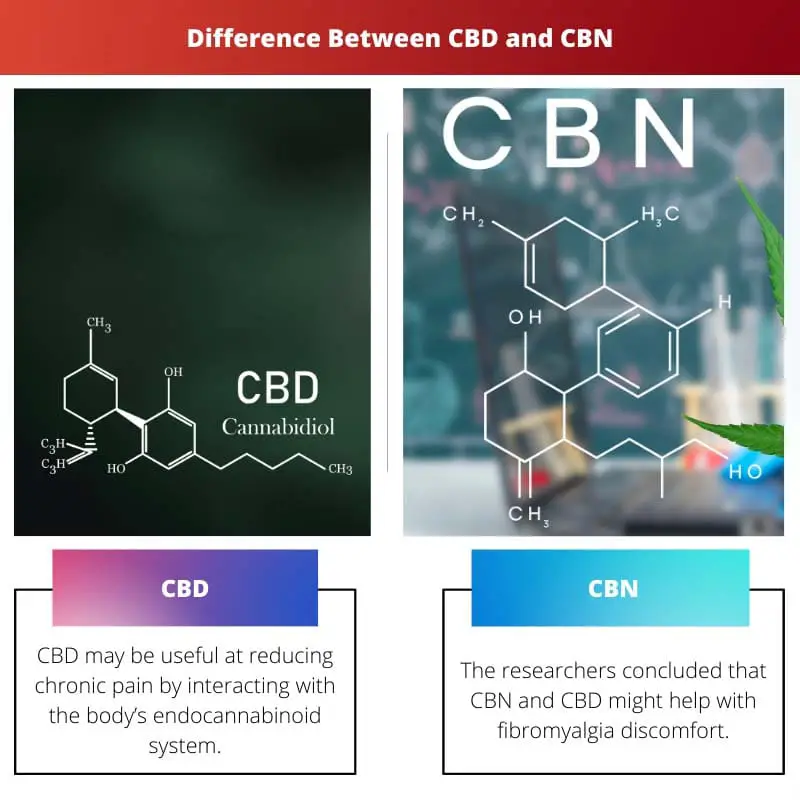Cannabidiol (CBD) and cannabinol (CBN) are two of the more than 100 cannabinoids present in the cannabis plant. CBD and CBN are considered gentler medicines.
That is, they are not psychoactive and have no effect on your mind. Instead, they’re marketed for their health advantages. Despite the fact that CBD and CBN interact with the same receptors in your body, but their effects are not the same.
Key Takeaways
- CBD (cannabidiol) and CBN (cannabinol) are two non-psychoactive cannabinoids in cannabis plants.
- CBD has a wider range of therapeutic applications, including anxiety relief and anti-inflammatory effects, while CBN may help with sleep and pain relief.
- CBN results from the degradation of THC, while CBD is a naturally occurring compound in cannabis.
CBD vs CBN
CBD (cannabidiol) is the most abundant cannabinoid in the cannabis plant and is known for its potential therapeutic effects. CBN (cannabinol) is a minor cannabinoid that is produced from the degradation of THC and is mostly found in aged cannabis plants, as THC breaks down into CBN over time.

CBD, or cannabidiol, is one of the most well-known cannabinoids present in the cannabis plant. CBD, unlike THC, does not produce the euphoric effects or “high” associated with THC.
CBD is quickly becoming a popular alternative therapy for a wide range of ailments. It is frequently used to treat symptoms of anxiety, sleeplessness, and a variety of chronic pain and other medical disorders.
CBN, or cannabinol, is another cannabinoid found in the cannabis plant. It is the end result of oxidation. CBN has the potential to provide a variety of health and wellness advantages.
Even when ingested alone, CBN has anti-inflammatory and anti-convulsant qualities. When coupled with CBD, CBN may also serve as an appetite stimulant in rats and as a pain reliever.
Comparison Table
| Parameters of Comparison | CBD | CBN |
|---|---|---|
| Pain relief | CBD may be useful at reducing chronic pain by interacting with the body’s endocannabinoid system. | The researchers concluded that CBN and CBD might help with fibromyalgia discomfort. |
| Benefits | CBD has been shown in studies to help with cancer treatment side effects like pain and nausea. | There is some evidence that CBN may lessen arthritic inflammation in rats Trusted Source. |
| Side effects | Diarrhea, fatigue, weight, and appetite fluctuations are the most prevalent adverse effects. | CBN has no known adverse effects, but that doesn’t rule out the possibility of them. |
| Research | CBD has received greater attention in the treatment of anxiety, seizures, and pain. | CBN, on the other hand, has been regarded to be most beneficial for sleep, hunger stimulation, and pain relief. |
| Uses | CBD applications/uses include anti-inflammatory and antioxidant properties, anti-seizure properties, anti-anxiety, and anti-depressant properties, and so on. | CBN can be used to relieve pain, stimulate hunger, and promote comfortable sleep. |
What is CBD?
CBD, or cannabidiol, is present in low concentrations in many cannabis cultivars. CBD is well-known for its ability to alleviate muscular pain, chronic tissue pain, inflammation, and convulsions.
CBD has a variety of applications, including the ability to reduce anxiety and depression, relieve pain, alleviate cancer-related symptoms, reduce acne, have neuroprotective properties, benefit heart health, anti-tumour effects, diabetes prevention, substance abuse treatment, antipsychotic effects, and anti-inflammatory properties.
CBD is not psychoactive, does not produce euphoria, and will not get you high. CBD-rich cultivars contain relatively little THC. Aside from smoking, users may consume CBD in a variety of different ways.
Two of the most common methods are oil and alcohol.
Cannabidiol can be ingested orally via the mouth, inhaled as cannabis vapour or smoke, or sprayed into the cheek as an aerosol spray.
It is available as oil with solely CBD as one of the active components (no terpenes or additional THC), dried cannabis, capsules, CBD-dominant hemp extract oil, or as a prescription liquid solution.
CBD has anti-seizure properties, fights depression, can fight cancer, treats sleep problems, reduces the risk of diabetes, and is neuroprotective, anti-ischemic, anti-spasmodic, immunosuppressive, anti-emetic, analgesic, and anti-psychotic.

What is CBN?
Cannabinol, known as CBN, is an oxidative breakdown product of tetrahydrocannabinol (THC). It is produced when THC is exposed to ultraviolet light and air over time. Cannabinol is a psychoactive substance.
CBN is soluble in a fatty body, whereas water rejects it. It has a unique connection with THC. This is due to the fact that CBN does not originate straight from the cannabis plant. Instead, it results from the oxidation of THC on the outside.
THC can also be said to leave CBN (Cannabinol) during its breakdown. THC eventually becomes CBN when cannabis is chopped, as it is. When it comes to appetite, CBN has a different effect than CBD.
CBN increases appetite. This can be quite advantageous for persons who are unable to acquire weight due to medical concerns.
CBN is present in very modest amounts in the cannabis plant. It possesses anti-inflammatory and pain-relieving properties. CBN is formed during the ageing and decarboxylation process and has played an important role in many medical conditions.
CBN has minimal to no intoxicating properties. CBN benefits include; anti-convulsive properties, acting as an appetite stimulant, promoting bone-cell formation, and antibacterial properties, and it is also good for patients suffering from multiple sclerosis.
Main Differences Between CBD and CBN
- Cannabidiol, derived from hemp plants, is a non-psychoactive chemical. Whereas CBN (Cannabinol) is a non-psychoactive cannabinoid found in aged Cannabis.
- Blue Mystic Feminized Seeds are the best CBD Cannabis seed. In contrast, Black Indica Feminized Cannabis Seeds are the best CBN Cannabis seed.
- The one disadvantage of CBD (Cannabidiol) is that it may not be suitable for everyone. The disadvantage of CBN (Cannabinol) is that it has not been as well investigated as Cannabidiol.
- CBD might induce dry mouth and can interfere with blood pressure medications, making them less effective. It has no negative effects on the stomach. If you are on any medications, you should be extremely cautious. Whereas, CBN has only one adverse effect: it might make you tired and sluggish.
- CBD is legal in all 50 states in the United States. In contrast, CBN is not included in the UN Narcotic Drugs Convention on Psychotropic Substances.

- https://www.sciencedirect.com/science/article/pii/S0379073819304761
- https://www.sciencedirect.com/science/article/pii/0091305788900822

I disagree with the claim that CBN has no known adverse effects. This article should have addressed that potential point of contention more clearly.
CBD and CBN are truly fascinating substances. This article was quite enlightening.
Interesting article, it’s amazing to learn about the wonders and benefits of CBD and CBN. I’ll be sure to do more research.
A very informative read, I appreciate the clear comparison between CBD and CBN. This really helps in understanding the differences in their uses.
This article was very helpful, but I do wish there was more information on the potential side effects of CBD and CBN.
A fantastic breakdown of the differences between CBD and CBN, I really enjoyed this read.